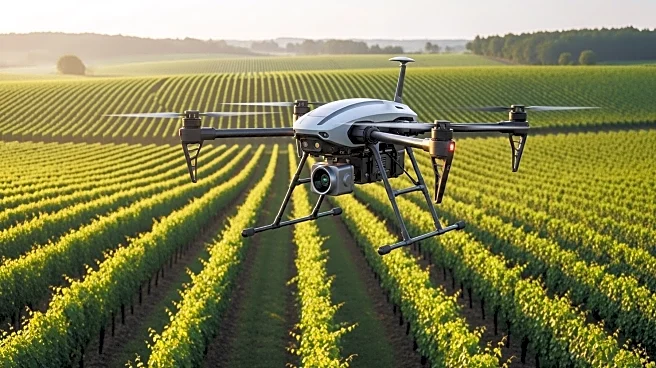What's Happening?
The Smart Vineyard Management Market is experiencing significant growth, projected to reach USD 3.39 billion by 2030, up from USD 1.82 billion in 2024. This expansion is driven by the adoption of precision agriculture technologies, including IoT-based sensors, GPS-guided machinery, drones, and AI-powered analytics. These technologies are being used to monitor environmental conditions, optimize irrigation, detect diseases early, and improve grape quality. The shift towards data-driven vineyard management aims to reduce operational costs and enhance resource efficiency, such as water, fertilizer, and labor. The market is responding to a rising demand for premium and sustainable wine, with consumers increasingly willing to pay more for sustainably produced bottles.
Why It's Important?
The growth of the Smart Vineyard Management Market reflects a broader trend towards sustainable and efficient agricultural practices. As consumer preferences shift towards ethically produced goods, vineyards that adopt these technologies can gain a competitive edge by offering premium quality and environmentally responsible products. This trend is particularly pronounced among Millennials and Gen Z, who prioritize sustainability in their purchasing decisions. The integration of AI and machine learning in vineyard management is also transforming the industry by enabling real-time decision-making and improving crop management. However, the high initial investment costs for these technologies pose a challenge, particularly for small and mid-sized vineyards, potentially slowing adoption in some regions.
What's Next?
The market is expected to continue evolving with further integration of AI and machine learning, enhancing the precision and efficiency of vineyard operations. As technology becomes more accessible and affordable, more vineyards may adopt these systems, potentially leading to increased market penetration. Additionally, the development of financial aid or subsidies for smart agriculture could accelerate adoption, particularly in price-sensitive regions. The ongoing trend towards sustainability and premium wine production is likely to drive further innovation and investment in smart vineyard management technologies.
Beyond the Headlines
The shift towards smart vineyard management has broader implications for the agricultural sector, highlighting the potential for technology to enhance sustainability and efficiency. This trend may influence other areas of agriculture, encouraging the adoption of similar technologies to address challenges such as resource scarcity and climate change. The emphasis on sustainability also reflects a growing consumer demand for transparency and ethical production practices, which could reshape industry standards and consumer expectations.









